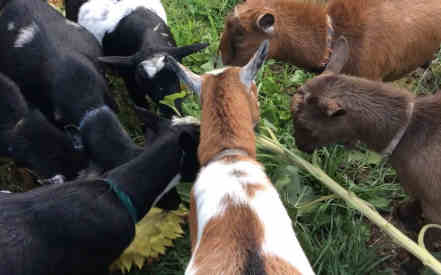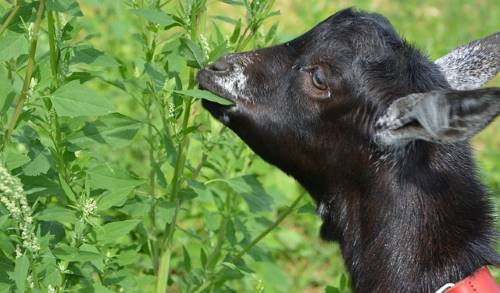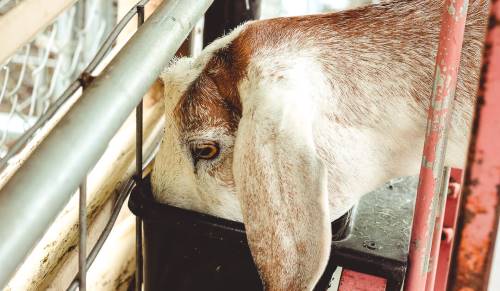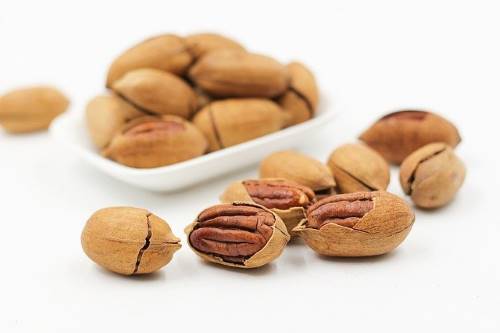When I first began raising goats on my little homestead, the question – can goats eat sunflower seeds? – popped into my mind. After all, the small, nutty seeds were a favorite snack of mine, and I wondered if my caprine companions could share the delight. The answer, I found out, was a resounding yes. But like all things in farming and animal care, there’s more to the story.
Sunflower seeds, packed with nutrients, offer a myriad of benefits for our bearded friends. From boosting their coats’ sheen to providing essential vitamins, these seeds can be a delightful addition to a goat’s diet. But, and there’s always a but, moderation is key. Overfeeding can lead to unexpected health issues.
Diving deep into this topic, I’ve gathered everything a goat owner should know about feeding sunflower seeds to their charges. Whether you’re a seasoned farmer or a newbie with a pair of bleating kids in your backyard, this guide will illuminate the dos and don’ts of sunflower seeds in a goat’s diet. Let’s explore.

Can goats eat sunflower seeds?
If you’re a goat owner, you may wonder if sunflower seeds are a healthy treat for your goats. The answer is yes, to a certain extent. While sunflower seeds are fine to feed your goats in moderation, it’s important not to overfeed them.
Sunflower seeds are a good source of protein and fat for goats. They also contain vitamins and minerals such as vitamin E, magnesium, and selenium. Sunflower seeds can help keep your goat’s coat healthy and can also provide them with extra energy.
When feeding sunflower seeds to goats, it’s important to do so in moderation. It’s also important to offer plenty of hay and fresh water along with sunflower seeds. This will help ensure that your goats get all the nutrients they need and prevent them from overeating the sunflower seeds.
[GoatAffiliate]
The benefits of eating sunflower seeds for goats
You may not have realized it, but sunflower seeds are a great source of nutrition for goats. Packed with essential vitamins and minerals, sunflower seeds can help keep your goat healthy in several ways. Here are a few benefits of feeding sunflower seeds to your goat.
An excellent source of vitamin E
Vitamin E is important for goats because it helps to protect their cells from damage. It is also an antioxidant, which can help reduce inflammation. Sunflower seeds are a great source of vitamin E and help keep your goats healthy.
High levels of vitamins and minerals
Sunflower seeds are also high in vitamins and minerals. This includes zinc, selenium, phosphorus, and magnesium. These nutrients are important for goats because they help to keep their bones and teeth healthy.
They also help to support the immune system and metabolism. Sunflower seeds are a great way to give your goats the nutrients they need to stay healthy and thrive.
Can improve the health of your goat’s coat
Another benefit of eating sunflower seeds for goats is that it can improve the health of their coat. The fatty acids in sunflower seeds can help to keep your goat’s coat soft and shiny.
In addition, the selenium in sunflower seeds can help to protect your goat’s coat from damage caused by environmental factors such as UV radiation.
A good source of protein and fiber
Another excellent benefit of eating sunflower seeds for goats is that they are a good source of protein and fiber. Protein is essential for goats as it helps them to grow and develop properly.
Fiber is important for goats as it helps them to stay digestive system healthy. Sunflower seeds are a good source of protein and fiber, making them an ideal addition to your goat’s diet.
A natural dewormer
One of the biggest benefits of sunflower seeds is that they can act as a natural dewormer for your goat. Studies have shown that sunflower seeds contain compounds that can help to kill off parasites and worms in the gut.
Not only does this mean that your goat will be healthier, but it also reduces the chance of them passing on parasites to other animals.
Things to watch out for when feeding sunflower seeds to goats

Goats love sunflower seeds, and they’re a great source of nutrients. However, there are a few things you need to know before you start feeding sunflower seeds to your goats. Here are three things to watch out for when feeding sunflower seeds to goats.
Don’t Overdo It
While sunflower seeds are a great source of nutrients, they’re also high in fat. That means that if you overdo it, your goats could get obese. So, while 2-3 tablespoons of sunflower seeds for an adult goat may be fine, monitor your goat’s weight and adjust the amount accordingly.
Watch Out for Mold
Sunflower seeds are a favorite food for mold spores, so it’s important to inspect the seeds before you feed them to your goats. If you see any mold outside the seed, throw them away.
Also, store the seeds in an airtight container in a cool, dry place – otherwise, they’ll go bad quickly.
Watch for pesticides
Pesticides can be a problem for goats, so it’s important to ensure that the sunflower seeds you’re feeding your goats are organic.
Non-organic sunflower seeds may be treated with pesticides that can harm goats. So, if you’re unsure whether the sunflower seeds are organic, it’s best to be safe and not feed them to your goats.
How often should goats eat sunflower seeds?
While goats are known for their hearty appetite, they should not be given unlimited access to sunflower seeds. A small serving a couple of times per week is sufficient.
Too many sunflower seeds can lead to digestive problems, such as bloating and diarrhea. In addition, sunflower seeds are high in fat and calories, which can cause weight gain.
When feeding goats sunflower seeds, offering a balanced diet that includes hay, pasture, and other healthy snacks is important. Doing so can ensure that your goats stay healthy and happy.
How to prepare sunflower seeds for feeding to goats
Before you start shelling out sunflower seeds to your goats, there are a few things you need to know to ensure that they’re getting the most nutrition possible.
With a little preparation, you can ensure that your goats are getting all the goodness that sunflower seeds offer. Here’s what you need to know.
Hulled or Unhulled?
You first need to decide whether you want to feed your goats hulled or unhulled sunflower seeds. Hulled sunflower seeds have the hard outer shell removed, while unhulled seeds still have the shell intact. Both options have their advantages and disadvantages.
Hulled sunflower seeds are more expensive than unhulled seeds, but they’re also easier for goats to digest. If you choose hulled seeds, you’ll need to be careful not to overfeed your goats, as they can easily gorge themselves on the soft flesh of the seed.
You’ll also need to ensure that hulled sunflower seeds are stored in a cool, dry place, as they can go bad quickly once the shell has been removed.
Unhulled sunflower seeds are less expensive than hulled seeds, but they’re also more difficult for goats to digest. If you choose unhulled seeds, you’ll need to soak them in water for at least 24 hours before feeding them to your goats. This will help soften the hard outer shell and make them easier for your goats to digest.
You’ll also need to be careful not to overfeed your goats on unhulled sunflower seeds, as they can cause digestive problems if eaten in too large of quantities.
Can baby goats eat sunflower seeds?

Baby goats are very active and need a lot of energy to run and play. A small serving of sunflower seeds can help provide them with the extra energy they need. Sunflower seeds are also a good source of essential vitamins and minerals, making them a healthy treat for baby goats.
However, limiting the number of sunflower seeds that baby goats eat is important. A couple of times per week is sufficient, and their diet should otherwise be the same as that of an adult goat. By following these guidelines, you can ensure that your baby goat stays healthy and happy.
Can goats eat sunflower plants?
If you’re considering adding sunflowers to your goats’ diet, you may be wondering whether or not they can eat the plants. The good news is that goats love sunflowers and happily munch on the leaves and stems.
However, sunflowers are not particularly nutritious, so they should only be given as a treat or occasional filler food. Sunflower plants are relatively low in protein and other essential nutrients, so they should not make up the bulk of your goats’ diet.
Instead, focus on feeding them hay, pasture, and other high-quality hay. Doing so will ensure that your goats stay healthy and happy.
Can Goats Eat Sunflower Seed Kernels?
Sunflower seed kernels are the edible part of the sunflower seed, and they are perfectly safe for goats to eat. Sunflower seed kernels are a good source of protein and essential fatty acids, making them an excellent addition to a goat’s diet.
Too many sunflower seeds can cause digestive problems in goats, so it is best to give them as a treat rather than a mainstay of their diet. With that said, there is no reason why goats cannot enjoy the occasional sunflower seed kernel.
Can Goats Eat Sunflower Seed Hulls?

Sunflower seed hulls are the hard shell that encases the seed’s edible portion. The hulls have already been removed when you buy sunflower seeds from the store. However, goats can safely eat sunflower seed hulls. The hulls contain fiber and other nutrients that can be beneficial for goats.
In addition, goats are equipped with a four-chamber stomach that helps break down tough plant material. As long as the hulls are not moldy or otherwise spoiled, they make a perfectly healthy snack for goats.
Can you feed your goat roasted sunflower seeds?
Sunflower seeds are a popular snack food, but you may be wondering if they are safe for goats. While roasted sunflower seeds do have fewer nutrients than unroasted seeds, they are still safe for goats to eat.
Just be sure to avoid any sunflower seeds flavored with salt, sugar, or other seasonings. In moderation, sunflower seeds can make a healthy treat for your goat.
What other nuts and seeds can goats eat?

While sunflower seeds have their merits in a goat’s diet, there’s a broader spectrum of nuts and seeds that might cross a goat owner’s mind. These nutritious tidbits can be tempting treats, but how many of them are genuinely goat-approved? Let’s navigate through some popular options, shedding light on their suitability for our furry friends.
Peanuts
Goats tend to enjoy peanuts, and they are generally safe for them. They’re rich in protein and fatty acids which can provide an energy boost. However, it’s crucial to feed peanuts unsalted and in moderation to avoid potential health issues. Just like with sunflower seeds, too much of a good thing might upset a goat’s stomach.
Read More: Can Goats Eat Peanuts? Great Benefits In Moderation
Acorns
Acorns, especially when they’re green, contain tannins that can be toxic to goats in large quantities. While goats might snack on a few acorns if they come across them, it’s not advisable to make acorns a regular part of their diet. If your grazing area has many oak trees, it’s wise to keep a watchful eye during the fall season.
Read More: Can Goats Eat Acorns? 5 Important Benefits
Walnuts
While walnuts aren’t inherently toxic to goats, the husks can develop a fungus called ‘Juglone,’ which can be harmful. Consuming large amounts of walnuts or their husks can lead to stomach upset or more severe health complications. It’s best to keep goats away from walnut trees and their fallen fruits.
Read More: Can Goats Eat Walnuts? Simple Answer & Feeding Tips
Almonds
Almonds are generally safe for goats but should be given as an occasional treat. They are high in fats and should be unsalted. Just like with other nuts, it’s vital to ensure that the almond’s size doesn’t pose a choking hazard, so offering crushed or slivered almonds can be a better choice.
Read More: Can Goats Eat Almonds? Yes, In Moderation
Pecans
Pecans can be a tasty treat for goats, but again, moderation is the watchword. High in fats and rich in energy, they can be beneficial in colder months when goats need extra calories. However, consistent or excessive feeding might lead to weight issues.
Read More: Can Goats Eat Pecans? Simple Answer & Feeding Tips
Can goats eat sunflower seeds – final thoughts
So there you have it – everything you need to know about feeding sunflower seeds to goats. When given in moderation, sunflower seeds can be a healthy treat for your goats that provides them with extra energy and helps keep their coat healthy.
Just be sure not to overdo it – a small handful every 2 days or so is a good rule of thumb. And as always, offer plenty of hay and fresh water along with the sunflower seeds.
